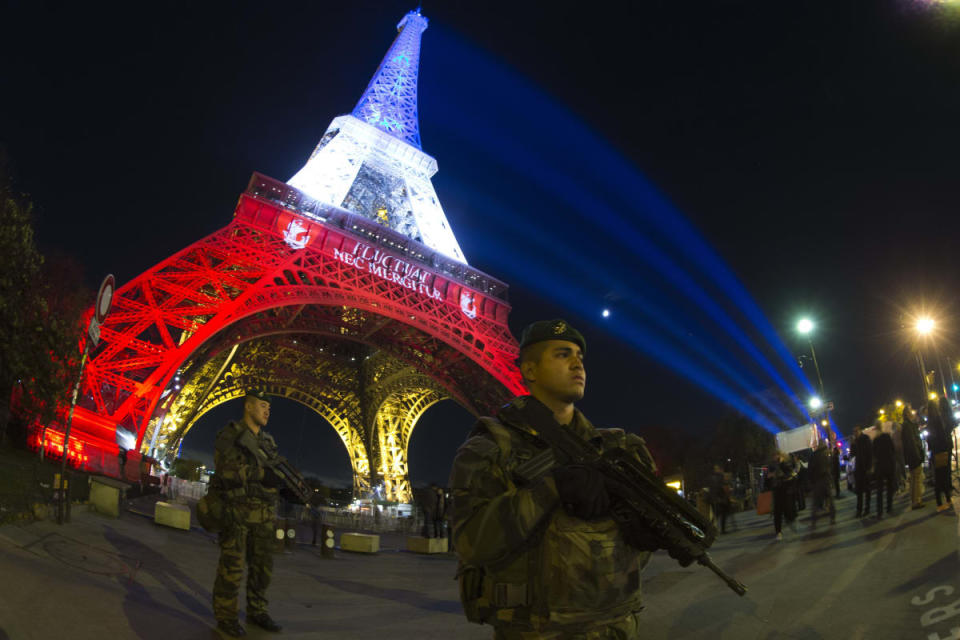Paris and the trail of social media misinformation

In the wake of the multi-pronged terror attacks on Paris last Friday, social media was awash with emotion; from concern and outrage to offers of support to those in need. Unfortunately, social media was also the site of a litany of misinformation. A Sikh man was Photoshopped wearing a suicide bomb vest and holding up the Quran when he was really just holding an iPad. Rumors spread that the Eiffel Tower had gone dark in memory of the victims, when it really just goes dark every night at 1 am. Uber was accused of charging surge prices in Paris when it didn't. A Donald Trump tweet from January about the Charlie Hebdo attacks was retweeted and spread around as if it was new.
Of course, the spread of rumors and untruths in the immediate aftermath of a tragedy isn't exactly a new phenomenon. Ryan Lanza was misidentified as the shooter behind the Sandy Hook massacre (it was actually his brother) and Reddit users accused the wrong people as suspects in the Boston marathon bombing. Some of this information isn't exactly harmless -- while misinterpreting the Eiffel Tower going dark is a silly mistake, the misidentification of wrong-doers can ruin lives.
But what exactly causes this? What about Twitter and Facebook makes people so gullible and willing to believe anything? Why do we feel the need to share information so rapidly without checking if it's true?
Wow. Lights off on the Eiffel Tower for the first time since 1889. pic.twitter.com/ZkeU5GmJfM
— Woke Jeff Jarvis (@ProfJeffJarvis) November 14, 2015
"This phenomenon can result from an 'information cascade,'" explained Coye Cheshire. Cheshire is a social psychologist who's also an Associate Professor for the School of Information at the University of California, Berkeley. "[It's when] an observer sees something and does the exact same thing despite one's own beliefs or other private information to the contrary."
"If you have ever been shopping at the store and cannot choose between two equivalent brands of soup, you may be more likely to choose the one that only has a few cans left instead of the one that is fully stocked -- because there must be a reason everyone is buying one brand and not the other, right?" said Cheshire. The spread of information on social media operates in very much the same way -- if a story or tweet gets a lot of likes or shares, it must be true. Right? Humans tend to make these cognitive shortcuts, said Cheshire, because it's easier than endlessly researching every piece of information we come across.
We also tend to put more trust in the first piece of information we get -- it's a cognitive bias called "anchoring" -- which makes it even harder to reverse our initial impressions. Mainstream media isn't exactly blameless in all of this either. In the rush for pageviews, sometimes sites think it's more important to be first than to be right. And when mainstream media picks a story up, people tend to fall for it even harder.

Sometimes rumors spread because we want them to be true, which Cheshire describes as confirmation bias. When the Photoshopped photo of Veerender Jubbal as a suicide bomber was circulated, it might've been because it aligned with the popular misconception that men who wear turbans are terrorists. The rumors of Uber multiplying surge pricing was spread far and wide likely because of Uber's already tarnished reputation (it did apply surge pricing in New York during Hurricane Sandy and was harshly criticized for it) and the company itself isn't very popular with European regulators.
It's worth noting that a rapid spread of information isn't necessarily a bad thing. In times of emergency, sometimes it's good to quickly disseminate news so people can seek shelter or protection. In Paris, for example, people were using the #PorteOuverte (which translates to "Open Door") hashtag to match those who were seeking shelter to those who were willing to offer it. Similarly, Americans were offering their homes to stranded Parisians who had their flights cancelled with the #StrandedinUS hashtag. According to Cheshire, these "information cascades" are an important part of human societies because survival can sometimes depend on it. "[It] does not imply that people actually 'trust' all of the information," he said, just that there's a tendency to share and distribute information quickly for a perceived good.

Another possible reason for all the retweets and sharing of viral content? Popularity. "If you have ever logged into Facebook to see how many (if any) people have 'liked' your post, then you have experienced the power of social approval," said Cheshire. "It might seem like such a small reason, but when you consider the relatively low cost of sharing information on social media, the power of social approval can really stand out."
Put it all together and it's easy to see why people give in to spreading the news without checking it first. But if you want to avoid being one of them, there are a few simple steps you can take. First, try to seek out the original source of a story. From there, check to see if the source is reliable -- check out the Twitter account to see if it has a history of fake news or see if the URL leads to a fake site. If the news source has political leanings that skew far left or far right, that could be a sign of biased information too. On the whole, try to exercise some critical thinking -- be wary of crowd think and potential red herrings. Always search to see if the facts are right.
Of course, despite our best intentions, the internet will always be a place where both valuable information and misinformation thrive. Just so long as we realize, whether it be on social media or not, that not everything we read on the internet is true.
[Image credit: Getty Images, AFP/Getty Images]
